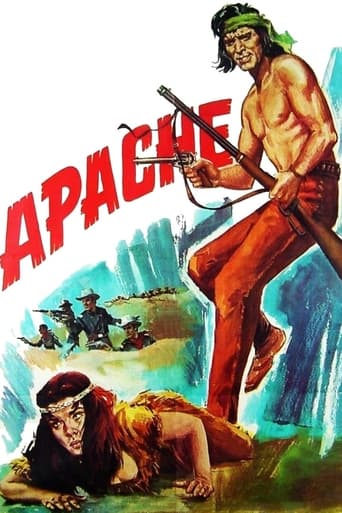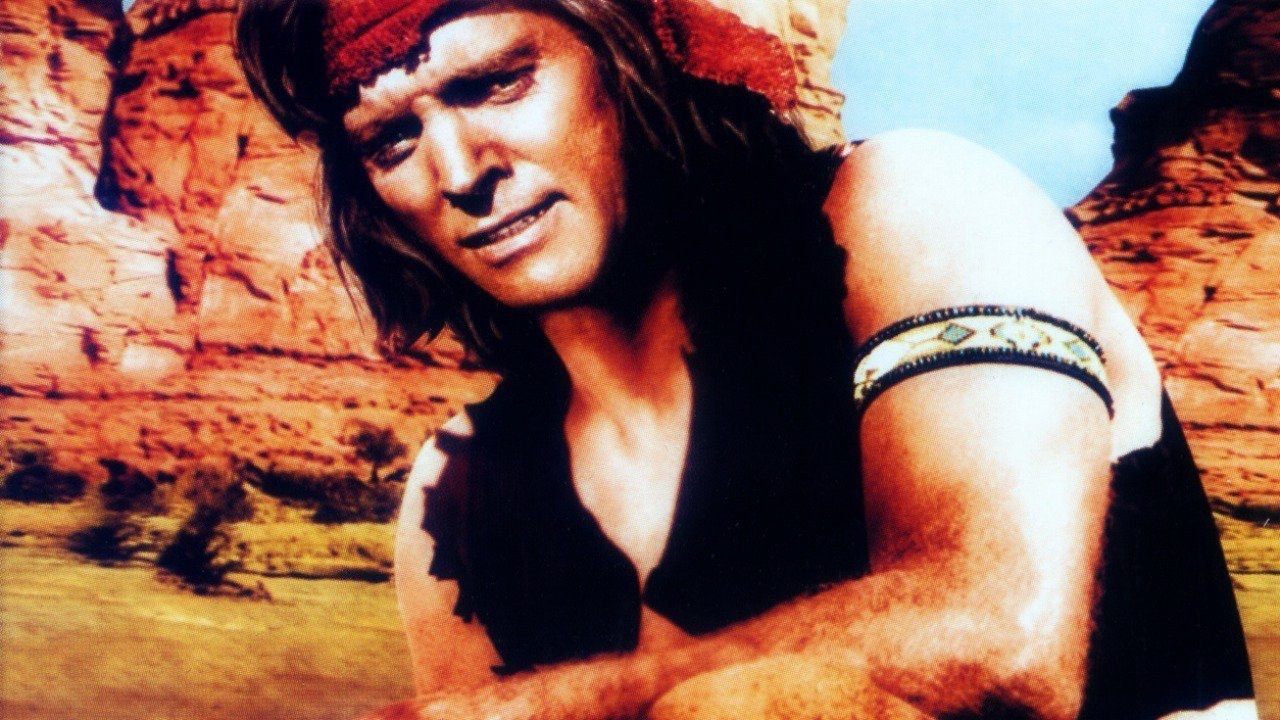John T. Ryan
THIS PRODUCTION IS one of many contradictions. It tries hard to show us the view of history from the perspective of the American Indian. The tribe of choice here is obvious from the very title. They were also among the most ferocious fighters on the face of the earth.IN HERE LIES the problem for at appears that this production from Burt's own Hecht-Lancaster Productions/United Artists attempts to show it all, but sophomoric-ally tends to romanticize the situation.THERE IS NO denying that the various tribes that populated what is now the USA had suffered some great deal of high-handed, unfair and double dealing when it came to their status as citizens and even as being human. There were multiple cases of our Federal Government's habit of unilaterally violating treaties and other agreements made with the various Indian nations.WE HADN'T SEEN this film since its initial release in 1954. We caught it on cable and the handy-dandy DVR. Somehow it seemed less spectacular and more formula.THERE APPEARS TO be a tendency to romanticize the civilizations of those less technologically advanced as being some how more naturally virtuous. Hence we have the myth of "the Noble Savage." The operational, though false, premise being that the primitives are somehow closer to Nature and to God.THIS PRODUCTION STRIKES a sort of middle of the road approach between the tribal ways of life and the harsh treatment delivered by the Feds. It is our contention that the former is soft-soaped while the latter is at least somewhat exaggerated.AS FOR THE portrayal and characterization of the main character, Massai, it has its ups and downs.TO BEGIN WITH, his super stoic, anti-social and savagely brutal mindset appears to be contradicted by his intuitive rationale and sense of fair play. A definite duplicity and contradiction exists in the portrayal.ANOTHER AREA OF dramatizing that has some great variety to its part in the story is the wardrobe modeled by Mr. Lancaster as solo warrior, Massai. One ensemble is definitely on the right track and features some leather vest and long pants, topped off with the required wrap around kerchief tied around the head. Another puts us in mind of something that he would have purchased from Eddie Bauer's or Lands End.
ianlouisiana
Mr B.Lancaster was one of Hollywood's greatest athletes.He had the grace of Astaire,the menace of Cagney and the magnetism of Welles. From "The Killers" onwards,he grinned and grimaced,loping across the screen and hypnotising the camera. Arguably the zenith of his career was "The Crimson Pirate",with his performance as Masai in "Apache" approaching it,despite the film itself being inferior. This wasn't the movie Mr Aldrich set out top make,with studio bean - counters interfering with his vision,but it is arresting and intriguing nonetheless. External factors aside,Mr Lancaster manages to outpower the production with the sheer energy of his performance. In the days when First Nation actors were generally reduced to "rhubarbing" and riding around wearing huge headdresses it was quite common for big stars to display bronzed faces and torsos,look grim and speak pidgin English. Masai (Mr B.Lancaster) escapes from a train after the Apache surrender and takes a cold - eyed look at "civilised" white society which confirms his belief that he wants no part of it. He is only "tamed" by the love of a good woman (Miss J.Peters) who although she may not have turned him into a New Man,succeeds,by having his child,in turning him away from the path of conflict. A not particularly convincing ending shows him accepting the White Man's terms. Just occasionally Masai looks a bit pouty - but who's to blame him for that? Even in it'd flawed state,"Apache" is an interesting film hat helped to open the way to a more fair - minded treatment (at least in the movies) of First Nation people.
nvilar
Apache is one of the first Hollywood films which dealt in a serious, thought-provoking and openly sympathetic way with the suffering of the native Americans as a consequence of the white man's expansion to the West. It is interesting to watch this film side by side with, for instance, John Ford's silent classic The Iron Horse, as we can see two opposite approaches to the history of the American West in the late 19th century. While Ford's epic production is a hymn to white man's progress and to the expansion of civilization to the wild, unexplored territories of the United States inhabited by the Indian nations, Apache is a touching drama about the desperate fight for survival of those same Indians, who were ruthlessly driven out of their ancestral lands and ways of life by the stern advance of material progress. The plight of the Apache nation is embodied by the central character of the film, the strong, stubborn, freedom-loving and nobly human Indian warrior Massai, played by the actor Burt Lancaster, who was also the inspirer and producer of the film. Unwilling to accept personal slavery and what he deems as the total humiliation of his nation after Chief Geronimo's surrender to the U.S. Army and the confinement of the Apache tribes to the reserve, Massai decides to start a one-man fight for human dignity and freedom and becomes a solitary outlaw at war with the local U.S. Army garrison.The film is certainly worth watching, not only because of the human interest of the story itself, but also as a well-crafted piece of cinema. Apache is the first great movie by the director Robert Aldrich, who in that year of 1954 would score double and reward us with another masterpiece, the unforgettable Veracruz, also with a Burt Lancaster in absolute state of grace as an actor, this time teaming with the veteran Gary Cooper.If in Veracruz Lancaster gave as a memorable performance as the attractive villain Joe Erin, here he is no less powerful as the honest and indomitable warrior Massai. At his side, also good performances by Jean Peters in the role of the faithful, ever-loving and determined squaw Nalinle, and John McIntire as the hard-boiled, cynical Indian-hunter Al Sieber, in a role that prefigures the twilight heroes of Peckinpah's films.All in all, a classic of the Western genre which inaugurated Aldrich's later shining career.
James Hitchcock
Like "Broken Arrow", which came out four years earlier, "Apache" deals with the Apache Wars of the late nineteenth century and is loosely based on fact. It is, however, set at a rather later period of history than the earlier film. Geronimo, the last Apache chief to continue to resist the white settlement of the American South-West has finally been forced to surrender to the US Army. (Geronimo played a minor role in "Broken Arrow" as the main opponent of Cochise's peace treaty with the whites). Geronimo and his warriors are transported by train to a reservation in Florida. While they are passing through St Louis, however, one warrior, Massai, manages to escape and sets out to walk all the way to back his homeland.Another similarity between this film and "Broken Arrow" is that both are made from a point of view sympathetic to Native Americans. Indeed, "Apache" goes further than the earlier film in this respect. In "Broken Arrow" the main Indian character, Cochise, and the main white character, Tom Jeffords, are both treated sympathetically and are given equal prominence. Here Massai is very much the most important character, more prominent than any of the white characters, none of whom are particularly sympathetic. A key scene in the film comes when Massai, on his long trek back to the South-West, meets a Comanche farmer in Oklahoma. Hitherto Massai, like all Apaches, has seen himself as a proud hunter and warrior, scorning all those, be they whites or members of other Indian tribes, who earn a living by growing crops. Seeing, however, that the Comanche live in peace with their white neighbours, he reasons that a similar change of lifestyle could enable the Apache to do the same. Upon his arrival back in the Apache homelands, however, he discovers that the white settlers and the military have no intention of allowing him to live in peace, and he begins a one-man war against them. As in "Broken Arrow" the main Indian characters, Massai and his wife Nalinle, are played by white actors, something which would today doubtless be condemned as politically incorrect but which in the fifties would have been regarded as quite acceptable. Burt Lancaster may have been attracted to the part by his liberal political convictions which were to become more important in his choice of roles later in his career. It must be said, however, that Lancaster is far less convincing as an Indian than Jeff Chandler had been in "Broken Arrow"; no attempt was made to hide the fact that both he and his co-star Jean Peters had blue eyes, something not normally associated with pure-bred Apaches. Another Indian character is played by a white actor, a young Charles Bronson in an early role. This was not, in fact, the first film in which Lancaster had played an American Indian; three years earlier he had played the title role in "Jim Thorpe- All American". Thorpe, however, although a member of the Sac and Fox nation, had European blood on both sides of his family, so Lancaster's looks were not such an issue in that film. "Apache" is a frequently enjoyable Western adventure, but I would not rate it as highly as "Broken Arrow". Whereas "Broken Arrow" had tried to present a more balanced picture of life in the Old West than many traditional Westerns, which had simply portrayed Native Americans as bloodthirsty savages, "Apache" goes too far in the other direction, substituting for the old stereotype a new one of the American Indian as heroic noble savage. Burt Lancaster gets a chance to show off the athletic and acrobatic skills which were his stock-in-trade during the early part of his career, but this is not really one of his best performances or one of his best films. 6/10



 AD
AD






